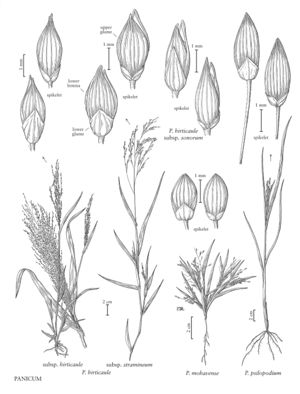familyPoaceae
subfamilyPoaceae subfam. Panicoideae
genusPanicum
subgenusPanicum subg. Panicum
sectionPanicum sect. Panicum
speciesPanicum hirticaule
subspeciesPanicum hirticaule subsp. sonorum
Panicum hirticaule subsp. sonorum
Treatment appears in FNA Volume 25. Treatment on page 462.
Culms 60-100 cm, robust; nodes hirsute, hairs papillose-based. Sheaths hirsute, hairs papillose-based; blades 4-30 mm wide, hirsute, hairs papillose-based, cordate, clasping basally. Panicles nodding. Spikelets 3-3.3 mm; lower paleas more than 1/2 as long as the upper florets. 2n = unknown.
Discussion
Panicum hirticaule subsp. sonorum has been collected only a few times. Its range extends from southern Arizona to Chiapas, Mexico. It may have originated through selection and cultivation. The Cocopa tribe of the extreme lower Colorado River region grow it for the seed, which is used for food.
Selected References
None.
Lower Taxa
None.
"decumbent" is not a number."-11-veined" is not declared as a valid unit of measurement for this property.
... more about "Panicum hirticaule subsp. sonorum"
absent +
common +
absent +
bulliform +
absent +
membranous +
gaping +
apiculate +
puberulent +
acuminate +
absent +
absent +
arising +
single +
sulcate +
cordate-clasping +
cormlike +
rounded +
membranous +
thick +
adaxial +
hirsute +
secund +
absent +
sterile +
spikelike +
absent +
sterile +
not developed +
absent +
thick-walled +
arranged +
surrounded +
2;6 +
papillose-based +
sometimes longer +
hirsute +
small green +
branching +
annual +
robust +
climbing +
floating +
decumbent +
herbaceous +
not compressed +
narrow +
1/2 +
waisted +
large +
hard +
capillary +
germination +
adjacent +
sometimes longer +
well-developed +
absent +
reduced +
bisexual +
plump +
absent +
herbaceous +
shorter +
shorter or longer +
subtending +
tuberculate +
unequal +
membranous +
equal +
well-developed +
papillose-based +
clasping +
glabrous +
lacking +
cordate +
punctate +
Present +
axillary +
thick-walled +
arranged +
surrounded +
thick-walled +
arranged +
surrounded +
thick-walled +
centripetal +
elongated +
spongy +
absent +
distichous +
cauline +
hyaline +
coriaceous +
absent +
membranous +
free +
absent +
inconspicuous +
glabrous +
cuneate +
fleshy +
staminate +
sterile +
reduced +
3-5-veined +
minute +
9-veined +
hyaline +
absent +
separated +
hyaline +
involute +
absent +
hirsute +
absent +
glabrous +
clasping +
keeled +
condensed +
contracted +
diffuse +
subterranean +
nodding +
pyramidal +
varying +
absent +
divergent +
appressed +
separating +
thin +
inconspicuous +
evident +
winter +
lunate +
absent +
higher +
thick-walled +
anatomy +
closed +
shorter +
surrounded +
hirsute +
not compressed +
complex +
bisexual +
unisexual +
sessile +
length +
reddish-brown +
attached +
absent +
glabrous +
equaling +
Panicum hirticaule subsp. sonorum +
Panicum hirticaule +
subspecies +
hyaline +
membranous +
bisexual +
ellipsoid +
7-11-veined +
much longer +
absent +
subequal +
shorter to much +
shiny +
(5)7-15-veined +
rugose +
separated +
absent +
prominent +
scabridulous +
rhizomatous +
perennial +
cespitose +
annual +
herbaceous +
variable +
